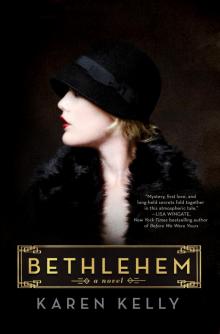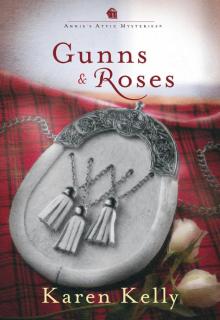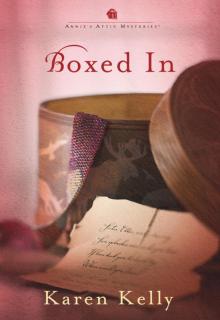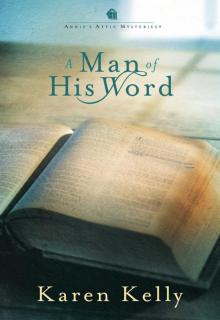- Home
- Karen Kelly
Bethlehem Page 3
Bethlehem Read online
Page 3
After a few minutes of letting India fish, Wyatt once again gave in to his hectoring heart. Leaning close, he said under his breath, “Maybe we should give Sassy a chance.”
India patted his shoulder as she stood—she had a veiled empathy for Wyatt’s case. “Here, Sass, it’s your turn.”
As intermediary, Chap grabbed the pole—inadvertently forcing a blush as his hand brushed India’s. Oblivious, he made the toss to Susannah and went back to his captain’s shift, guiding the raft with the skill of a seasoned gondolier.
Susannah flicked the line and made a very good cast. She turned to Kit and narrowed her eyes. “Watch and learn.”
Kit just shook his head. “If you catch anything, it will be a cold from when I toss you into the river.”
The quintet floated in silence for a time as the raft drifted slowly past the leafy banks, lulled to lethargy in the wavy shimmer of the late-summer haze. The Lehigh River wound from the ridges of the Appalachian Mountains through the heart of the Lehigh Valley, zigzagging along the lush gorge until it joined the waters of the Delaware on its path to Cape May. But the soothing somnolence of the river was shattered by a sudden squeal as Susannah jumped to her feet. “I felt something! I felt a tug!”
“Reel it in!”
“Don’t reel too fast!”
“Give it a jerk!”
“Use your wrist!”
The instructions were flying fast and furiously, but Susannah was slim and light, and the fish was patently not. She flew off the raft as though the thing were reeling her in.
One second later, Wyatt was in the water.
Susannah came up just fine, but she had lost her grip on the rod, which was still attached to the fish and heading west. Sassy Parrish was not a girl who would lose her brother’s fishing rod. She had left her stockings and shoes on the riverbank, tucked under a yew, but her skirt was heavy against her legs. Fortunately, she was swimming with the current, and there was a bit of leeway while the fish ran out the reel. She was just within reaching distance when the slack ran out and the pole leaped forward.
Wyatt wasn’t far behind, and there was plenty of shouting from the raft.
“Leave her and get the rod!” Kit was cursing under his breath, hoping the cork would keep it afloat, while Chap stood by unhelpfully, calling out feeble advice through gales of laughter.
“Go get ’er, Wyatt! Try the backstroke! Watch out for snapping turtles!”
India had grabbed the barge pole and was stabbing through the water in an attempt to slow down the raft. Kit and Chap had been careful about keeping them close to shore, well within reach of the river bottom, but in the clamor, they had drifted and now they were out of their depth. They were picking up speed as the raft veered into the main current.
In what would have been a stroke of luck, the fish shot under a partially submerged fallen tree, snagging and snapping the line. The fishing rod lodged in a fork. But the raft was enjoying its liberty, and they could only watch the rod disappear as they sailed past the tangled limbs. At that point, Kit evidently reconsidered his priorities and turned his attention to his sister. “Just leave it, Sass!” he had to shout now as the distance grew. “Come on—you’re losing ground!”
Susannah could be stubborn, but she wasn’t foolish. She struck out after the raft, kicking against her twisting skirt, and as she got close, her brother lay on his stomach and reached out to grab her hand.
Wyatt, however, lagged behind, fighting a helical current that was pulling him toward the bank. Chap had stopped laughing and was standing aft, his hands to his mouth, hollering imperatively at his little brother. “Come on, Wyatt! We can’t come back for you! You can make it!”
Susannah threw one leg up onto the old boards and Kit heaved her up, while India wrung her hands and peered worriedly back at Wyatt. “I knew this was a bad idea,” she said to no one in particular. “We are going to be in so much trouble.”
Wyatt’s struggling form was growing smaller and smaller. The group was quiet for a moment, bewildered by the expanding distance, but then they realized with relief that Wyatt was swimming to shore. Chap made one more effort to communicate, cupping his hands to his mouth with a feeble and ridiculous “Don’t forget the rod!” The boys looked at each other and broke into laughter again.
“Poor sucker.” Kit was shaking his head. “The road to hell is paved with good intentions.”
Chap rolled his eyes and turned to take the barge pole from India. “Girl intentions,” he said drily.
“He’ll have a good walk home from there,” Kit said, grinning at the thought. “Maybe he’ll dry out by then.”
“I don’t know what you think is so funny,” India said. “You’re going to be in worse trouble than any of us. When Hep finds out you took these barrels, you’re finished. And look at Sassy’s dress.” Susannah was wringing out the hem, but the batiste cotton was a dripping morass and had a six-inch tear where it had snagged on one of the rough planks.
India’s concern wasn’t unfounded. At the beginning of the summer, Kit and Chap had come up with a plan to build a raft. It took some doing, but over the course of a few weeks they had managed to steal eight small oil drums from the steelyard, along with what used to be Henrik Hansen’s shed. To be fair, the old toolshed had been abandoned for years. The hardest part was finding a long enough barge pole. They had finally come up with the idea of sneaking into the forging plant to steal a fifteen-foot furnace rod from the No. 2 machine shop.
“The only way he’ll find out is if you tell him, Itty,” Kit said accusingly. Then he turned to Susannah and narrowed his eyes. “You’d better think up a whopper, Susannah.”
Only in rare circumstances did Kit ever call his youngest sister by her given name, so Susannah knew she was on thin ice. The boys’ plan that day had not included the girls. They had made the usual arrangements with Ben Swenson to pick them up two miles downriver, at Bryce’s Landing. Ben was a local dairy farmer who had a hay wagon that made a perfect trailer for hauling the raft back to the grove near the flats where they kept it. Most of the time they had to wait awhile, but eventually Ben would get there with his ancient plow horse, Guvner, and for fifty cents he would help them load the raft onto the wagon and pull it to the grove.
That morning, however, the boys made the critical error of retrieving their fishing gear from the shed behind the stables at Brynmor just as Susannah had finished grooming Pericles, her little Arabian gelding. With the stealth of a leopard, she followed them to the river, and—with no real intention of actually blowing the whistle—handily extorted an invitation. Then, pushing her advantage, she ran to get her sister.
As it was turning out, unwanted guests weren’t the only challenge of the day. Bryce’s Landing was just a sliver of brown on the bank as they tried and failed to navigate the current with no oar. The boys were shirtless already, but now Chap was taking off his belt and rolling up the legs of his pants. He turned to Kit, a grim twist on his lips. “We’re gonna have to get in.”
The current was moving faster as the river widened, and although the boys kicked furiously as they grasped the edges of the two portside drums, it was nearly impossible even to keep up with the raft, much less steer it. But, in an effort laced with stifled profanities, they somehow managed to push out of the current. Susannah had been testing the depth with the pole, but by the time she felt the river bottom, the boys were making better progress from the water, and they finally shoved the vessel onto a sandy strip about a half mile south of the landing.
With heaving chests, Kit and Chap flopped onto the deck, lying back, their eyes closed to the sun. “Now what?” Kit exhaled the question with a huff of frustration and more than a little annoyance. There was no road through the thick arboreal cover where they had come ashore, and no way Ben could get his wagon through.
“Could we just leave it here?” Susannah asked, wanting to be helpful. She was fully aware of her culpability. “Hep could have a boat come and tow it.”
There was no response from either of the boys. Chap had covered his eyes with the crook of his arm, and Kit just groaned. India was looking around futilely, but then she had an idea.
“It looks pretty clear along the shore. Maybe you could walk it back in the water.”
The boys sat up and looked upriver. It did appear to be pretty smooth going, with no fallen trees in sight, but it wasn’t a straight shot and they couldn’t see beyond the first bend.
Forty minutes later they were sliding the raft up the apron of the landing. On the way, they had been forced to float it around a tangled strainer of limbs and a rock jetty, but the current was far weaker in the shallow water. As they were pulling the ropes to hoist it onto the bank, they noticed the back of the wagon moving away up the road, and Kit had to run, hollering and waving his arms, to get Ben’s attention.
It took some maneuvering to turn Guvner around—in his old age the horse had only left turns remaining—but Ben finally worked his way back to the landing and the three men heaved the raft onto the wagon. Despite his rusticity, Ben was a gentleman. He courteously helped India and Susannah onto the buckboard, but then gave a weary, sour look to the boys, who had hopped up onto the wagon and were sitting on the raft. “You’re gonna have to get off. Guv can’t take that pile of junk plus the four of you up this hill.”
Trudging up the hill behind the wagon, the boys shook their heads and grumbled while the sisters turned around to wave and smile, gleefully rubbing it in with calls of “Nice day for a walk!” and “Such lovely weather we’re having.” At the top of the rise, Kit hoisted himself onto the back of the wagon and held his hand out to Chap, but Guvner stopped dead and wouldn’t budge until they got off again.
At the grove, Ben was awarded a dollar to compensate for his extra time and trouble, and he set off to the left as they tucked the raft away in the underbrush. When India sat down to pull on her lisle stockings, Chap picked up one of her shoes and peered at it intently. “Looks like a doll’s shoe. Can you really get your foot into it?” He ran his finger down the long row of small buttons. “This seems like a lot of work.”
India was tongue-tied, and a tide of red rolled up her neck and headed for her cheeks. Susannah responded for her sister. “It is a lot of work. Especially when we don’t have a hook.” Exasperated, she left half of the loops on her own shoes hanging open.
Recovering some composure, India found her voice. “I wonder if Wyatt made it back yet. Do you think he’ll tell on us?”
“Nah. He’s smarter than he looks.” The affection in Chap’s tone belied the faint praise of his words. “I bet I’ll find him on the porch with his face in a book and Hilda serving cake and lemonade.”
The girls finally got their shoes buttoned, and they headed up the hill on a dirt path. On a particularly steep pitch, India slipped. As it happened, Chap was behind her. With reflexive ease, he grabbed her by the waist and set her back on leveler ground. “Light as a moth,” he remarked. “Maybe those really are doll shoes.”
Susannah—who never missed a thing—sidled up to her nearly quivering sister and whispered, “You’re the moth and he’s the flame.” And India slipped again.
They made it through town without fanfare; the streets were fairly empty and they knew the quietest ones. India was still in the stars as they reached the lofty air of Fountain Hill—the privileged demesne of Bethlehem’s most fortunate daughters and sons—but Chap turned off toward Seneca Street, and as they approached Brynmor, she pulled herself back to Earth. “Wait behind the garage,” she instructed Susannah, “and don’t let Jimmy see you. I’ll get another dress.”
Susannah skirted the wide cobblestone drive toward the new five-stall garage built in front of the stables. Jimmy, the Parrishes’ driver, lived above the garage in the chauffeur quarters, but he was probably down below, polishing the Winton touring car or the Templar roadster. Hollins Parrish had a fondness for automobiles.
Since it was Saturday afternoon, they knew their father would be on the golf course. And, as luck would have it, their mother was preoccupied with the business of grooming. If Helen and Hollins Parrish weren’t entertaining guests on a Saturday evening, they had inevitable social obligations and could be found at the Fountain Hill Opera House or a St. Luke’s Hospital benefit or—as was the case this evening—a white-tie affair for the executive officers of Bethlehem Steel. In preparation for the event, their mother had been busy in her room with a hair stylist hired in from town and Lydia, the upstairs maid who doubled as a lady’s maid. This distraction played well for the erstwhile river rats, who scurried into the shadows of the house without so much as a squeal.
That evening when Elvie rang the dinner bell, they drifted to the breakfast room from their individual innocent occupations. The younger Parrishes were accustomed to being served at the small walnut breakfast table on Saturdays, as the opulent formality of the dining room—with its long, gleaming mahogany table—seemed ridiculous when populated solely by children.
On the way out, their parents appeared in the doorway. “Well, well, Hedy, what have we here?” Hollins said, unwilling to relinquish the teasing tone he’d taken with the children since they were toddlers. “Isn’t that the smithy’s son from the stables? And what of these pretty little girls? Are these the new housemaids?” He moved around the table, kissing each of them on the top of the head as he spoke. Tall and dignified, Hollins Parrish was imposing to most, but his children found him endearingly harmless. Although he was Dad or Daddy face-to-face, they tended to call him Hep when they were talking about him. It was the name his wife and friends called him—born of his monogram.
Helen was known by her friends as Hedy, but her children only called her Mother. She was a delicately beautiful woman, born in London to a preeminent banking family and raised in the Back Bay of Boston. Because her blue blood ran exceptionally warm, she was beloved by persons stationed high and low. “They are vagrants,” she said, smiling as she pulled on her gloves. “We’re feeding the needy tonight. I didn’t want to, but Elvie insisted.” Turning to the children, she said, “Please go to bed at a decent hour, you hooligans. We’re leaving promptly at nine for church in the morning, and I don’t want a struggle on my hands.” Taking her husband’s arm, she blew a kiss as they left, trailing a wake of Vetiver and elegance.
As the rumble of the car engine faded away, there was another sound—a tapping at the window. Elvie was serving small tulip cups of tapioca pudding, and Kit had to lean around her to see Chap peering into the room. Kit shook his head and put a finger to his lips, then made a discreet jabbing motion toward Elvie, but she had eyes in the back of her head and spoke without turning. “I suppose you should invite Mister Charles in,” she said placidly.
When Kit got to the door, Chap was waiting. His face was drawn and there was a frightful look in his eyes—walking the razor’s edge of panic. “Wyatt isn’t home. He never came home.” His expression spoke loud and clear: Please tell me nothing has happened to him. Please tell me he’s all right. Please don’t let it be possible that he’s not.
Without a backward glance, Kit was out the door—taking the wide marble steps two at a time, Chap right beside him. They flew down the hill and crossed the bridge on New Street, instinctively heading for the last place they had seen Wyatt. A short road ran along the ridge above the river; at the end of it they stumbled down through the underbrush and landed on a narrow dirt path that wound through the woods and followed the water. There was still enough daylight to see, but the thick canopy filtered it and the sun was ominously low.
“How far down do you think he was?” Chap asked, breathing hard but moving as fast as he could through the bramble. “Did you actually see him get out of the water?” His voice rang sharp and imperative; fear had turned him into a drill sergeant, barking out questions.
“He’s a good swimmer. He was really close to shore. Of course he made it.” Kit was giving his best effort at reassurance, but his words were hollow—he was as worried as his friend
. “Wyatt!” he shouted as they rushed through thicket. “Wyatt!” Chap joined in and they continued to call as they pushed along the path, stumbling over tree roots and rocks.
The light was disappearing fast as the sun went down, and darkness settled over them like a hood. Common sense said to get off the river and go for help, but desperation had the upper hand, forcing them forward with the foolish hope that they were going to find Wyatt there on the bank, safe and sound.
As they fought through an especially thick twist of undergrowth, they heard a faint sound. Chap stopped abruptly and held up his hand. “Shhh. What was that? Wyatt?” He craned his neck, listening. “Wyatt?” There it was again. Voices. As they peered through the woods they saw a flickering light in the distance. They moved forward, slower now—instinctually quiet and treading lightly on the sticks and fallen leaves.
“It’s a fire,” Kit whispered. “Smell the smoke?” He grasped Chap’s arm, signaling him to stop. “It might be drifters.” Wariness echoed in his voice. As schoolchildren, they had been warned many times to stay away from the tramp camps that dotted the river valley. Local lore about kid stew and roasted babies had disrupted plenty of bedtimes.
But urgency overrode childhood terrors, and they moved forward, straining to see through the dusk. Ridiculous as it was, the thought that Wyatt might somehow be sitting with the hobos, sharing a can of soup, had lodged hopefully in both of their chests.
As they neared the light they could see that it was, indeed, a small group of men, bearded and disheveled, sitting on crates around an oil drum fire. There was a smattering of conversation, but the words were impossible to make out. When the breeze blew east, subtle undertones of whiskey mingled with the smoke.

 Bethlehem
Bethlehem Gunns & Roses
Gunns & Roses Boxed In
Boxed In A Man of His Word
A Man of His Word